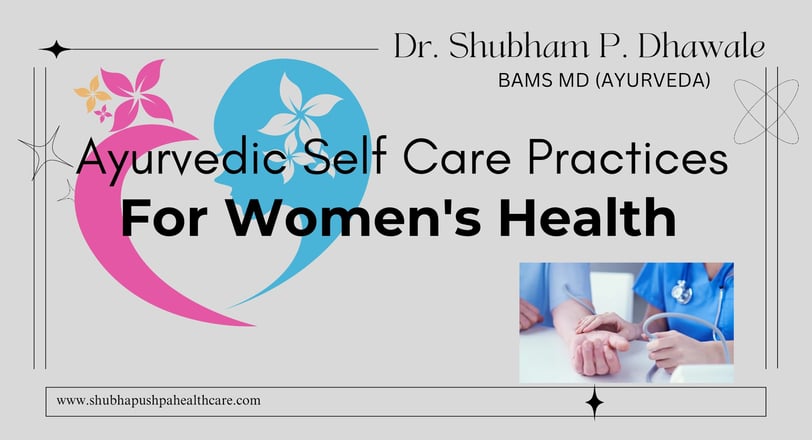Ayurvedic Self-Care Practices for Women's Health
Discover Ayurvedic self-care practices for women's health at every stage of life—menstruation, pregnancy, postpartum, and menopause. Backed by ancient shlokas and modern research, this guide covers diet, lifestyle, herbs, and Rasayana therapies to balance hormones, boost vitality, and promote holistic well-being. Read more: Shubhapushpa Healthcare
In today's fast-paced world, maintaining robust immunity is more crucial than ever. Ayurveda, the ancient science of life, provides a holistic approach to strengthening the immune system through natural methods that have been validated by modern research. This article explores the Ayurvedic perspective on immunity (Vyadhikshamatva) with references to classical texts and contemporary studies. Understanding Immunity in Ayurveda Ayurveda describes immunity as Vyadhikshamatva, which refers to the body's abili
4/1/20252 min read


Women’s health is intricately linked to hormonal balance, reproductive health, mental well-being, and immunity. Ayurveda, the ancient science of holistic healing, provides profound self-care practices tailored to support a woman’s body through different life stages—menstruation, pregnancy, postpartum, and menopause. This article explores Ayurvedic self-care for women, backed by classical shlokas and modern research.
Ayurveda’s Perspective on Women’s Health
Ayurveda considers women as the embodiment of Shakti (energy), and maintaining Rasa Dhatu (nutritional essence) and Shukra Dhatu (reproductive health) is essential for overall well-being. Acharya Charaka mentions:
"स्त्रीणां सन्तानसम्पत्तिर्मूलं जीवनसंग्रहः।"
(Charaka Samhita, Sharira Sthana 8/14)
(For women, reproductive health is the foundation of a healthy life.)
The key Ayurvedic principles for women’s self-care include Ahara (diet), Vihara (lifestyle), Dinacharya (daily routine), Ritucharya (seasonal care), and Rasayana (rejuvenation therapy).
Ayurvedic Self-Care for Different Phases of a Woman’s Life
1. Menstrual Health & Hormonal Balance
Menstruation (Rajah Pravritti) is a natural detoxification process. Ayurveda suggests:
Avoiding cold and heavy foods during periods.
Consuming warm, light, and nourishing meals like moong dal soup, ghee, and sesame seeds.
Using Ashoka (Saraca indica) and Shatavari (Asparagus racemosus) to regulate menstrual cycles (Journal of Ethnopharmacology, Sharma et al., 2013).
Practicing gentle yoga and meditation to reduce PMS symptoms.
2. Pregnancy & Postpartum Care
Pregnancy (Garbha Kala) is a sacred period in Ayurveda. Acharya Sushruta states:
"गर्भिण्याः हितं सर्वं हितं पुत्रस्य च स्मृतम्।"
(Sushruta Samhita, Sharira Sthana 10/3)
(What benefits a pregnant woman also benefits her child.)
Ayurvedic pregnancy care includes:
Consuming Satmya Ahara (wholesome foods) like milk, ghee, saffron, and dates.
Practicing Abhyanga (oil massage) with sesame or coconut oil to nourish the skin and joints.
Using Bala (Sida cordifolia) and Shatavari for uterine strength (International Journal of Ayurveda Research, Kumar et al., 2017).
Postpartum Care:
Following the Sutika Paricharya (postnatal regimen) with nourishing foods, herbal decoctions, and adequate rest.
Using Dashamoola (ten-root formula) to restore strength and balance Vata dosha.
3. Menopause & Aging Gracefully
Menopause (Rajonivritti) is a natural transition in a woman’s life. Ayurveda recommends:
Consuming cooling foods like ghee, Amla, and fresh vegetables.
Using Shatavari and Brahmi (Bacopa monnieri) to balance hormones and support mental health (Journal of Menopausal Medicine, Singh et al., 2019).
Practicing Pranayama and meditation to manage mood swings and hot flashes.
Essential Ayurvedic Self-Care Practices for Women
1. Dinacharya (Daily Routine)
Waking up early (Brahma Muhurta) to align with the body's natural rhythm.
Oil pulling (Gandusha) and tongue scraping for oral health and toxin removal.
Nasya (nasal oil application) to enhance mental clarity and prevent dryness.
2. Ritucharya (Seasonal Care)
Each season affects the body differently. Ayurveda recommends:
Pitta-pacifying foods (cooling fruits, coconut water) in summer.
Vata-pacifying diet (warm soups, ghee) in winter.
Kapha-reducing herbs (turmeric, ginger) in spring.
3. Rasayana Therapy (Rejuvenation Practices)
Acharya Charaka emphasizes Rasayana for longevity:
"रसायनं तु तद् ज्ञेयं येन वृद्धोपि युवा भवेत्।"
(Charaka Samhita, Chikitsa Sthana 1/1/4)
(Rasayana therapy restores youth and vitality.)
Chyawanprash for immunity and skin health.
Triphala for detoxification and digestion.
Shatavari Ghrita for hormonal balance.
Scientific Validation of Ayurveda for Women’s Health
Several studies confirm Ayurveda’s efficacy in women's health care:
A study in Journal of Ayurveda and Integrative Medicine (Mishra et al., 2021) found that Shatavari enhances female reproductive health.
Research in Phytotherapy Research (Baliga et al., 2020) highlights the anti-inflammatory benefits of Amla in managing menopause symptoms.
Evidence-Based Complementary and Alternative Medicine (Cohen et al., 2018) reported that Ashwagandha significantly reduces stress and enhances overall well-being in women.
Conclusion
Ayurveda provides a comprehensive self-care approach for every stage of a woman’s life. By embracing Ayurvedic diet, herbs, and lifestyle practices, women can maintain hormonal balance, improve vitality, and achieve holistic well-being. As ancient wisdom meets modern science, Ayurveda remains a timeless guide to women’s health.
Empower Yourself with Ayurveda!
For personalized Ayurvedic consultations, visit Shubhapushpa Healthcare.
It's not just a brand, it’s an emotion!
Pure Ayurveda Treatment
Rooted in tradition, backed by science
Experience the Power of Ayurveda
